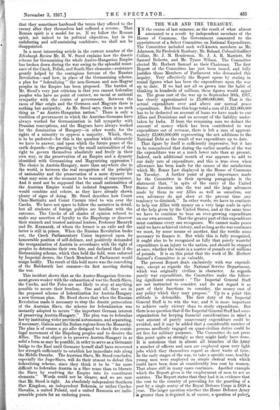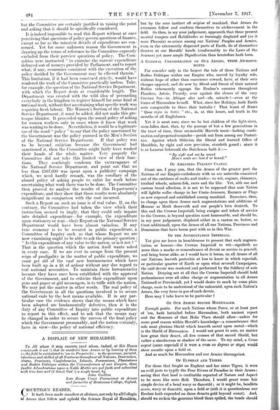THE WAR AND THE TREASURY.
IN the course of last summer, as the result of what almost amounted to a revolt by independent members of the House of Commons, the Government consented to the appointment of a Select Committee on National Expenditure. The Committee included such well-known members as Mr. Adamson, Sir Frederick Banbury, Mr. Boland, Colonel Godfrey Collins, Mr. J. M. Henderson, Mr. J. A. R. Marriott, Sir Samuel Roberts, and Mr. Tyson Wilson. The Committee elected Mr. Herbert Samuel as their Chairman. The first Report of the Committee has just been issued, and fully justifies those Members of Parliament who demanded this inquiry. Very effectively the Report opens by stating in round figures what has been the expenditure upon the war up to date. If we bad not all so grown into the habit of thinking in hundreds of millions, these figures would appal us. The gross cost of the war up to September 30th, 1017, has closely approximated to £1000,000,000. That is the actual expenditure over and above our normal peace expenditure. But from this huge total a sum of £1,321,000,000 has to be deducted on account of loans we have made to our Allies and Dominions and on account of the liability under- taken by India. If from the remaining sum we deduct the amount of money which has been contributed to war expenditure out of revenue, there is left a sum of approxi- mately £3,000,000,000 representing the net additions to the National Debt as the result of war expenditure up to date.
That figure by itself is sufficiently impressive, but it has to be remembered that during the earlier months of the war the expenditure was at a much lower rate than at present. Indeed, each additional month of war appears to add to our daily rate of expenditure, and this is true even when allowance has been made for the causes of the satisfaction which Mr. Boner Law displayed in the House of Commons on Tuesday. A further point of great importance made by the Committee in their opening paragraphs is the statement that, " in spite of the entry of the United States of America into the war and the large advances made by them to our Allies as well as ourselves, our own advances do not show at the present time any tendency to diminish." In other words, we have to continue to help our Allies with money on a very large scale in spite of the help given by the United States, and at the same time we have to continue to bear an ever-growing expenditure on our own account. That the greater part of this expenditure must continue every one recognizes. We cannot make peace until we have achieved victory, and as long as the war continues we must, by some means or another, find the terrific sums necessary to finance it. But while this is fully recognized, it ought also to be recognized as fully that purely wasteful expenditure is an injury to the nation, and should be stopped at once, whether the waste is a matter of pounds or of millions of pounds. It is on this point that the work of Mr. Herbert Samuel's Committee is so valuable.
The present Report deals exclusively with war expendi- ture, except as regards the National Service Department, which was originally civilian in character. As regards purely war expenditure, the Committee make the follow- ing significant statement : " The Imperial General Staff are not instructed to consider, and do not regard it as part of their functions to consider, the money cost of any policy which they may propose." Up to a point this attitude is defensible. The first duty of the Imperial General Staff is to win the war, and it is more important to achieve early victory than to study expenditure. But there is no question that if the Imperial General Staff had sonic organization for keeping financial considerations in mind a vast amount of purely unnecessary expenditure could be avoided, and it may be added that a considerable number of persons needlessly engaged on quasi-civilian duties could be set free for military purposes. The Committee do not press this point quite as strongly as they might fairly have done. It is notorious that in almost all branches of the Army a number of officers and men are employed upon very light jobs which they themselves regard as sheer waste of time. In the early stages of the war, to take a specific case, healthy young men were employed on simple clerical work which could have been done at considerably less cost by women. That abuse still in many cases continues. Another example which the Report gives is the employment of men to act as sentries. The Report states that they had it in evidence that the cost to the country of providing for the guarding of a post by a single sentry of the Royal Defence Corps is £.850 a year. The larger question whether the Home Defence Army is greater than is required is, of course, a question of pollen but the Committee are certainly justified in raising the point and asking that it should be specifically considered.
It is indeed impossible to read this Report without at once perceiving that questions of policy govern questions of finance, except so far as the minutest details of expenditure are con- cerned. Yet for some unknown reason the Government in drawing up the terms of reference to the Committee expressly excluded from their purview questions of policy. The Com- mittee were instructed " to examine the current expenditure defrayed out of moneys provided by Parliament, and to report what, if any, economies consistent with the execution of the policy decided by the Government may be effected therein." This limitation, if it had been construed strictly, would have rendered the work of the Committee practically useless. Take, for example, the question of the National Service Department, with which the Report deals at considerable length. The Department was created with the wild idea of persuading everybody in the kingdom to register himself for some kind of national work, without first ascertaining what specific work was requiring fresh labour. The Women's Section of the National Service Department, it must be added, did not make this gro- tesque blunder. It proceeded upon the sound policy of asking for women workers only in cases where it knew that work was waiting to be done. Nevertheless, it would be a legitimate use of the word " policy " to say that the policy sanctioned by the Government was the policy pursued in the Men's Section of the National Service Department. If that policy was to be beyond criticism because the Government had sanctioned it, then the Committee might fairly have washed their hands of the whole matter. Very properly the Committee did not take this limited view of their func- tions. They scathingly condemn the extravagance of the National Service Department, and point out that no less than £107,000 was spent upon a publicity campaign which, we need hardly remark, was the corollary of the absurd policy of asking people to enlist for work before ascertaining what work there was to be done. The Committee then proceed to analyse the results of this Department's expenditure, and they show that those results were absolutely insignificant in comparison with the cost incurred.
Such a Report on such an issue is of real value. If, on the contrary, the Committee had taken the view which their instruction seemed to imply, that they could only inquire into detailed expenditure—for example, the expenditure upon stationery or rent—their Report on the National Service Department would have been almost valueless. If any true economy is to be secured in public expenditure, a Committee of Inquiry such as that whose Report we are now examining ought to be able to ask the primary question : " Is this expenditure of any value to the nation, or is it not ? " That is the question which the nation itself wants asked in every case. If we are ever to escape from the present reign of prodigality in the matter of public expenditure, we must get rid of the vast' new bureaucracies which have been built up in a fit of ardour without any due regard to real national necessities. To maintain these bureaucracies because they have once been established with the approval of the Government, and to criticize their expenditure upon pens and paper or girl messengers, is to trifle with the nation. We may put the matter in other words. The real policy of the Government in all the questions involved is to secure national ends by the best means available. If in any par- ticular case the evidence shows that the means which have been adopted are fundamentally defective, then it is the duty of any Committee of Inquiry into public expenditure to report to this effect, and to ask that the means may be changed in order to secure the success of the final policy which the Government presumably, and the nation certainly, have in view—the policy of national efficiency.















































 Previous page
Previous page